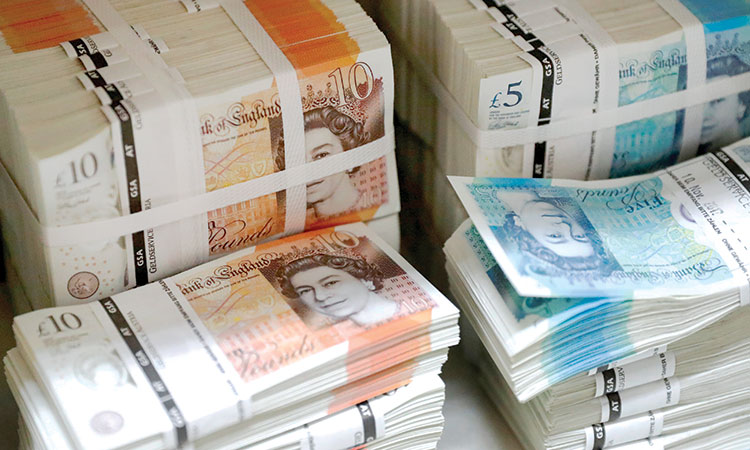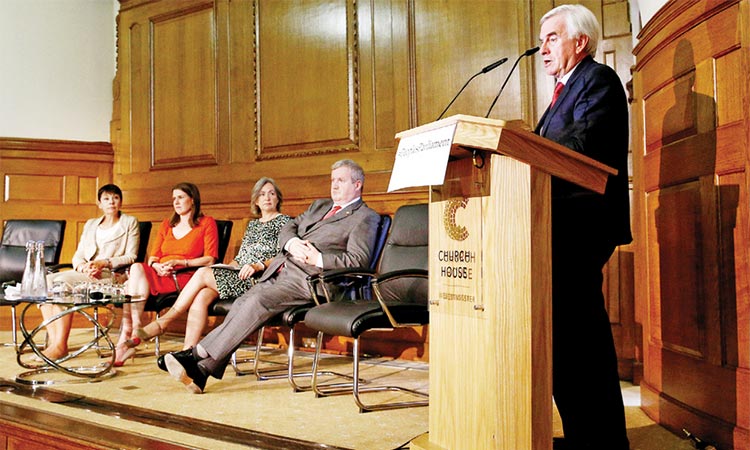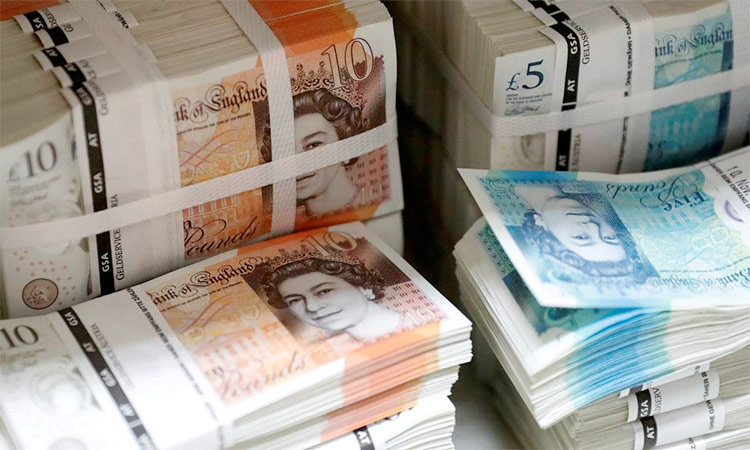European currencies edge higher on Brexit deal hopes

British sterling banknotes stacked in piles at the money service firm in Vienna, Austria. Reuters
Johnson’s plan to put his Brexit withdrawal deal to British lawmakers on Saturday was thwarted when they voted to withhold a decision and requested him to seek a third postponement of Britain’s departure from the bloc. At a rare Sunday meeting of ambassadors of the 27 states that will make up the EU after Brexit, the diplomats decided to forward Johnson’s deal to the European Parliament for its required approval. By 0910 GMT, the Polish zloty and Hungary’s forint each firmed about 0.2 per cent to trade at 4.2765 and at 330.25 to the euro respectively.
The Czech crown edged 0.1 per cent up to 25.618, clinging close to three-month highs. The Romanian leu was flat.
“If Boris Johnson manages to push his deal through the parliament this week, the crown may add to its gains and move close to 25.50 to euro,” CSOB/KBC analysts said in a note. Elsewhere, Romania holds a tender to sell 500 million lei of June 2024 treasury bonds.
“The market mood remains volatile due to Brexit uncertainties but we should see the auction filled around 3.85 per cent against last month’s 3.91 per cent,” ING said. Regional stocks mostly rose amid signs of progress in the United States-China trade talks, with Warsaw and Bucharest both gaining around 0.6 per cent on the day.
Sterling reached its highest in more than five months at $1.301 on Monday, as more investors rushed to cover short positions on signs that either Prime Minister Boris Johnson’s Brexit deal would pass or the Oct. 31 deadline would be pushed back.
In any event, the risks of Britain exiting the European Union without agreeing a transition deal − a no-deal Brexit − now appear so small that more investors are buying both pounds and UK-focused equities.
Sterling had earlier pulled back half a per cent after parliament delayed a crucial Saturday vote on Johnson’s Brexit deal on Saturday. But the currency held most of the 6 per cent gain chalked up since Oct. 10.
Johnson could now pass the deal by either winning a “meaningful vote” on Monday - if the lower house speaker allows a vote to go ahead - or by securing a majority when the Withdrawal Agreement Bill is introduced on Tuesday.
The pound rose to trade around flat after a lawmaker from the Northern Irish Democratic Unionist Party said it would not support any amendments providing for a customs union with the EU. Some interpreted that as suggesting they would support Johnson’s Brexit deal.
By 0910 GMT, the pound traded around $1.2985, just off its 5 1/2-month high. Versus the euro, it reached 85.91 pence but stayed off last week’s 5 1/2-month high.
Analysts said that while the DUP lawmaker’s comments appeared to have been the catalyst for the latest move, the market was being driven by investors scrambling to buy the currency before it rallied further, especially those who were “short” the currency.
“There is a FOMO in the market, fear of missing out, so everyone wants to be on the right side of the trade. We know sterling will appreciate if we get a deal and no deal is now unlikely... so that’s slightly skewing the bets,” said Morten Lund, strategist at Nordea Markets.
“If they don’t get the customs union through, (parliament) might pass the deal, that’s why the sterling is moving higher,” he added. Broader market sentiment mirrored that view, as gauges for implied sterling volatility in different tenures eased off recent highs.
Overnight volatility slipped to 19.6 vol from a three-year high of 30.3 vol on Saturday. One-month implied volatility, which encompasses the still-relevant Oct. 31 Brexit deadline, also declined.
Moreover, leveraged funds had fewer sterling short positions than in August, although volumes increased to $5.53 billion in the week to Oct. 15, CFTC data showed.
The optimism was also reflected in stock and bond markets. Mid-cap London-listed shares edged higher after first dropping 0.3 per cent. Yields on British government bond yields rose 5 to 7 basis points across the curve.
Uncertainty still lingers. The government says Britain will leave the EU on Oct 31 regardless of the amendment passed on Saturday that forces Johnson to seek a Brexit delay. French junior economic Minister Agnes Pannier-Runacher also said the UK could still leave in 10 days.
“I think markets are really trying to feel their way through this, but you don’t want to be caught short the pound at this point,” said Ned Rumpeltin, European head of currency strategy at TD Securities.
Reuters







